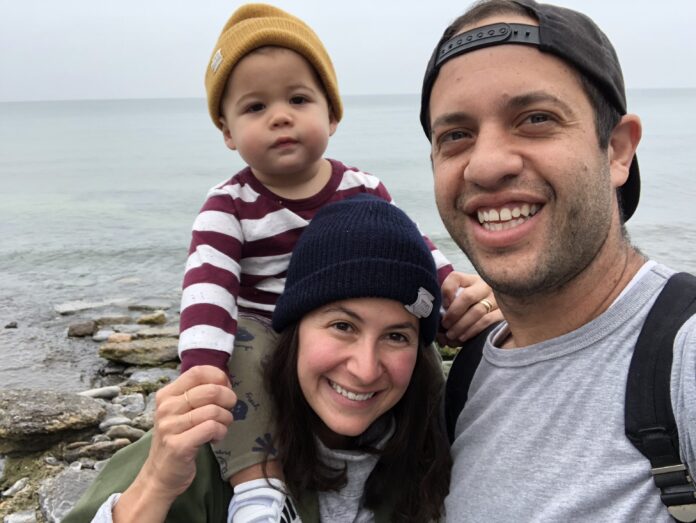After losing her second child in October 2019 while she was six months pregnant, Toronto mother Emily Getz set out to reframe her own mindset and that of others when it comes to the world of infertility.
“I was completely blindsided. I was really fortunate to conceive Ryder naturally and easily and quickly,” said Getz of her five-year-old son. “I was totally uneducated on the fact that that is actually something that doesn’t come easy for everybody.”
It was the devastating loss of a baby girl who she and her husband named Ruby that Getz said changed her life and was the reason her podcast Day 1 came to be.
Getz is candid about her own journey with infertility.
“We are still in the midst of building our family and I’ve gone through three rounds of IVF, which resulted in an ectopic pregnancy, I’ve had my right tube removed, we’ve had IUIs that have not worked for us, and most recently in January of this year, we conceived naturally … Unfortunately, at eight weeks we lost the heartbeat,” she recalled.
Through the podcast and mindset coaching, Getz openly chronicles the emotions, decisions, disappointments and truths behind a fertility quest.
“Day 1 is a lifeline for women who are navigating fertility circumstances they were not prepared to do. We are like a first of its kind support network,” she said.
Support is essential, Getz pointed out, for those experiencing infertility because, while the struggle is common, it can also feel “isolating and lonely.”
In fact, infertility affects approximately one in six couples in Canada, according to the Public Health Agency of Canada.
“It’s really building awareness that this is a reality for a lot of people and as soon as we can normalize that conversation, the support can level up,” she said.
“If you know somebody that is going through something like this, people tend to think that they’re walking on eggshells, like, ‘I don’t want to message them’, ‘I don’t want to check in with them because I don’t want to upset them,’ acknowledging that they are going through this is the best way to find support,” she added.
2:17
Marking Pregnancy and Infant Loss Awareness Day
Pregnancy and Infant Loss Remembrance Day is an annual day of remembrance observed on Oct. 15 to commemorate pregnancy loss, miscarriage and newborn death.
Trending Now
Diagnosing long COVID: Canadian researchers discover unique new clue
Climate protesters douse Vincent van Gogh’s ‘Sunflowers’ with tomato soup
Reproductive endocrinologist and Toronto fertility specialist, Dr. Ari Baratz said oftentimes fertility treatments are required to help individuals avoid recurrent pregnancy loss.
“When you experience multiple miscarriages or a late loss there is not just physical recovery, there’s emotional recovery. People don’t want that to happen again and if there’s any way of or any technology or any technique to reduce that, very often you will seek out fertility care, not because they can’t get pregnant, but because they want to pass that next phase,” he explained.
Baratz is also the president of Fertility Matters Canada, a national charity aiming to help Canadians living with reproductive health issues by offering support, education and awareness.
He noted the issue of infertility is one that affects a high number of Canadians.
“We think about about 15 to 20 per cent of Canadians have some element of a fertility-based issue or requiring assistance, which translates to millions and millions of Canadians … infertility does not discriminate, it doesn’t know color, it doesn’t know race, it doesn’t know gender, it really affects everybody,” he said.
Despite this, there exist disparities in access to fertility care across the country which create an additional barrier for many individuals.
“It is a bit of a moving target in the country … about half of our provinces have some form of financial support for fertility care, either locally or bursaries or grants to allow people to travel to areas where they have access and then we have just as many that are, let’s call it, in the works, looking at plans, looking at other provinces to see how they can provide support,” explained Baratz.
As of right now, five provinces provide some sort of public funding, according to Fertility Matters Canada, and it varies from one province to the next.
2:24
Why more awareness is needed for infertility in Canada
As an example, Ontario covers one cycle of IVF per patient under the age of 43, not including fertility drugs that cost an additional $5,000.
Baratz pointed to employers as another potential source of financial support for individuals looking to grow their families.
“Many people would be happier at work if they knew that their reproductive care could be covered partially by their employers and we know that many, many companies are looking at this as a benefit. But there’s no question that when we meet patients at the beginning of their journey, certainly midway and near the end of their journey, the financial exhaustion is as much there, unfortunately, as the medical exhaustion and the emotional exhaustion,” he said.
Baratz said he looks forward to a day when fertility care is treated like any other major health issue in Canada.
As for Getz, who is now dedicated full-time to her mindset coaching and fertility support community in addition to being a mother to her son, she said she is optimistic about her family’s future.
“Do I know what’s next? I know a baby’s next! I carry the belief that we are a family of four,” she said, adding, “I have no idea how the baby is going to come. It hasn’t come to me the way that I expected it to already, so what’s next is that Evan and I are still putting our best foot forward, optimizing our fertility and, you know, holding the belief that that baby is is going to come to us.”



